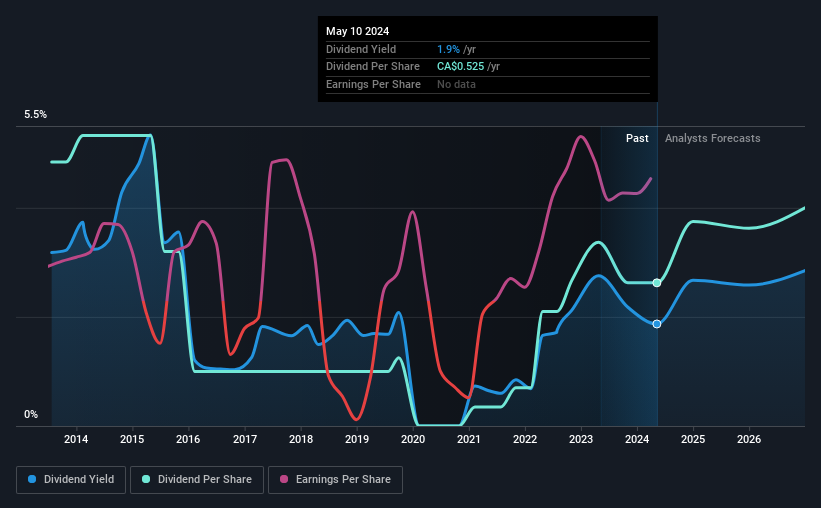Be Sure To Check Out Cenovus Energy Inc. (TSE:CVE) Before It Goes Ex-Dividend
It looks like Cenovus Energy Inc. (TSE:CVE) is about to go ex-dividend in the next four days. Typically, the ex-dividend date is one business day before the record date which is the date on which a company determines the shareholders eligible to receive a dividend. The ex-dividend date is important because any transaction on a stock needs to have been settled before the record date in order to be eligible for a dividend. Thus, you can purchase Cenovus Energy's shares before the 16th of May in order to receive the dividend, which the company will pay on the 31st of May.
The company's next dividend payment will be CA$0.135 per share, on the back of last year when the company paid a total of CA$0.52 to shareholders. Based on the last year's worth of payments, Cenovus Energy stock has a trailing yield of around 1.9% on the current share price of CA$28.07. If you buy this business for its dividend, you should have an idea of whether Cenovus Energy's dividend is reliable and sustainable. As a result, readers should always check whether Cenovus Energy has been able to grow its dividends, or if the dividend might be cut.
View our latest analysis for Cenovus Energy
Dividends are typically paid out of company income, so if a company pays out more than it earned, its dividend is usually at a higher risk of being cut. Cenovus Energy paid out just 23% of its profit last year, which we think is conservatively low and leaves plenty of margin for unexpected circumstances. A useful secondary check can be to evaluate whether Cenovus Energy generated enough free cash flow to afford its dividend. The good news is it paid out just 20% of its free cash flow in the last year.
It's positive to see that Cenovus Energy's dividend is covered by both profits and cash flow, since this is generally a sign that the dividend is sustainable, and a lower payout ratio usually suggests a greater margin of safety before the dividend gets cut.
Click here to see the company's payout ratio, plus analyst estimates of its future dividends.
Have Earnings And Dividends Been Growing?
Businesses with strong growth prospects usually make the best dividend payers, because it's easier to grow dividends when earnings per share are improving. If business enters a downturn and the dividend is cut, the company could see its value fall precipitously. That's why it's comforting to see Cenovus Energy's earnings have been skyrocketing, up 50% per annum for the past five years. With earnings per share growing rapidly and the company sensibly reinvesting almost all of its profits within the business, Cenovus Energy looks like a promising growth company.
The main way most investors will assess a company's dividend prospects is by checking the historical rate of dividend growth. Cenovus Energy has seen its dividend decline 5.9% per annum on average over the past 10 years, which is not great to see. It's unusual to see earnings per share increasing at the same time as dividends per share have been in decline. We'd hope it's because the company is reinvesting heavily in its business, but it could also suggest business is lumpy.
Final Takeaway
Is Cenovus Energy an attractive dividend stock, or better left on the shelf? Cenovus Energy has grown its earnings per share while simultaneously reinvesting in the business. Unfortunately it's cut the dividend at least once in the past 10 years, but the conservative payout ratio makes the current dividend look sustainable. Overall we think this is an attractive combination and worthy of further research.
Wondering what the future holds for Cenovus Energy? See what the seven analysts we track are forecasting, with this visualisation of its historical and future estimated earnings and cash flow
A common investing mistake is buying the first interesting stock you see. Here you can find a full list of high-yield dividend stocks.
Have feedback on this article? Concerned about the content? Get in touch with us directly. Alternatively, email editorial-team (at) simplywallst.com.
This article by Simply Wall St is general in nature. We provide commentary based on historical data and analyst forecasts only using an unbiased methodology and our articles are not intended to be financial advice. It does not constitute a recommendation to buy or sell any stock, and does not take account of your objectives, or your financial situation. We aim to bring you long-term focused analysis driven by fundamental data. Note that our analysis may not factor in the latest price-sensitive company announcements or qualitative material. Simply Wall St has no position in any stocks mentioned.

